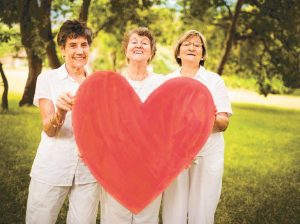 Imagine this: “Jack” is someone you love; he suffers from cardiovascular disease. Jack’s life is a series of seemingly endless trips to the offices of his primary care physician and cardiologist. These visits are stressful and tiring for Jack, challenging his breathing, causing him chest pain, and robbing him of energy. You are also exhausted from caring for Jack and getting him to his many medical appointments. You worry when Jack’s symptoms spike out of control, sending him to the emergency room yet again. Both you and Jack want peace more than anything: relief from the symptoms of Jack’s illness, but also peace that comes from living without so much anxiety, uncertainty, and stress.
Imagine this: “Jack” is someone you love; he suffers from cardiovascular disease. Jack’s life is a series of seemingly endless trips to the offices of his primary care physician and cardiologist. These visits are stressful and tiring for Jack, challenging his breathing, causing him chest pain, and robbing him of energy. You are also exhausted from caring for Jack and getting him to his many medical appointments. You worry when Jack’s symptoms spike out of control, sending him to the emergency room yet again. Both you and Jack want peace more than anything: relief from the symptoms of Jack’s illness, but also peace that comes from living without so much anxiety, uncertainty, and stress.
Avow, based in Collier County, offers a special program just for people like Jack and his family. Called the Advanced Cardiac Care initiative, the program was developed nationally by the National Partnership for Healthcare and Hospice Innovation (NPHI) and the American Heart Association (AHA). It brings together the best and most advanced treatments available for cardiac patients. Avow, a nonprofit hospice and palliative care provider for 40 years in Southwest Florida, is specially trained to offer the program locally to those with heart failure.
“Cardiovascular disease is the number one disease killer in America, yet less than 5% of otherwise qualified patients enter hospice care for help,” says Dr. Cynthia Nehrkorn, vice president of medical services for Avow, which is also a member of NPHI. “Too many people think hospice is for the last days or hours of life. That is not true, especially for seriously ill patients like those with end-stage heart disease. Hospice programs help people live comfortable, less stressful lives, even as their diseases progress. Some patients even live longer than their doctors predicted because they improve under hospice care. Hospice is all about peace of mind, for both patients and their families.”
The Advanced Cardiac Care program is a lifeline for patients, addressing care gaps that include low utilization of hospice care, low access to proper care for minority families, and lack of education in proper symptom management and care.
“Avow treats advanced cardiac care patients in their homes, where they are most comfortable,” says Nehrkorn. “Our clinical team members receive specialized training in how best to relieve the symptoms that plague heart patients, such as chest pain, fluid retention, shortness of breath, cough, fatigue, and loss of appetite or nausea. When patients receive this care in their homes, they are much more comfortable and at peace. Our program’s goal is to keep patients out of the hospital and out of waiting rooms, so they and their families can focus on the relationships and activities that make life meaningful.”
Cardiac patients in Avow’s program receive regular visits by a nurse to evaluate and manage their symptoms at home. Personal care aides assist with bathing and grooming the patient. There is no need for family caregivers to make multiple trips to a pharmacy: Avow has medications delivered directly to the patient’s home. Avow can also provide other equipment the patient needs, such as oxygen, an adjustable bed, and devices that assist the patient with walking.
“We work collaboratively with each patient’s primary care provider and/or cardiologist,” says Nehrkorn. “Hospice and palliative care programs take a team approach to care, involving not only the patient’s other medical providers but also the patient himself/herself and the family. We follow the lead of the patient, ensuring that we respect his or her goals for care and wishes for a calm and peaceful life.”
Avow’s program also includes emotional and spiritual support for patients and families who need help in coping with the demands of illness and caregiving. Bereavement specialists who work with children and adults help families and patients come to terms with their fears and losses; this care is available any time to anyone, without cost.
For more information about Avow’s Advanced Cardiac Care initiative, other hospice programs, palliative care program, or grief/loss support care for children and adults, visit www.avowcares.org or call (239) 280-2288.
239.280.2288
www.avowcares.org









